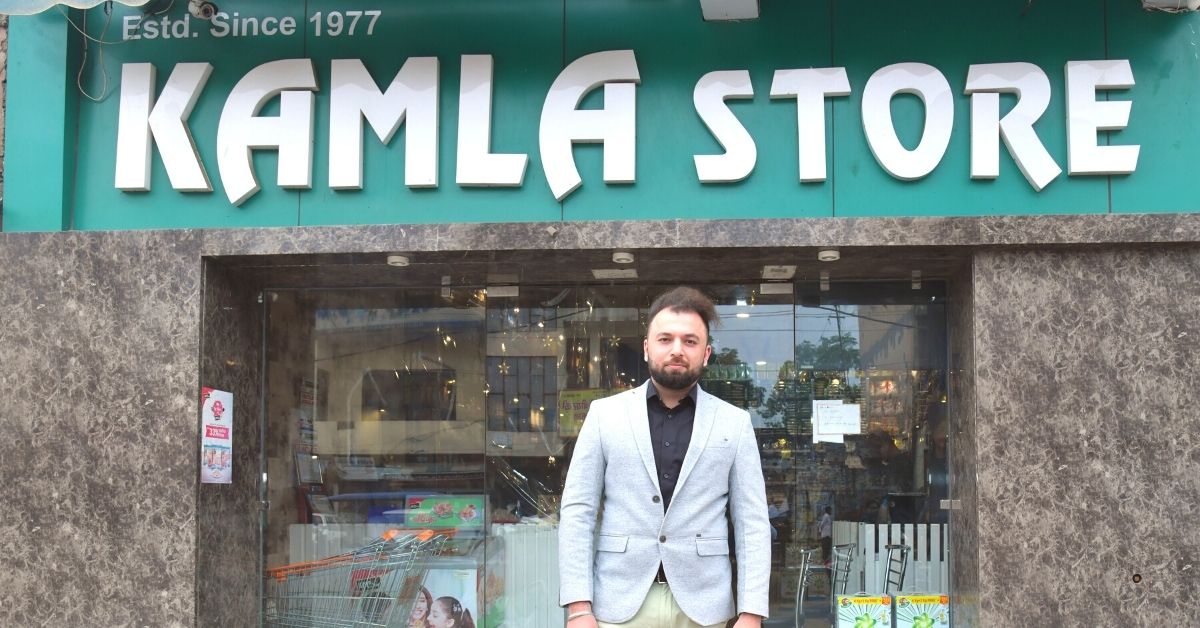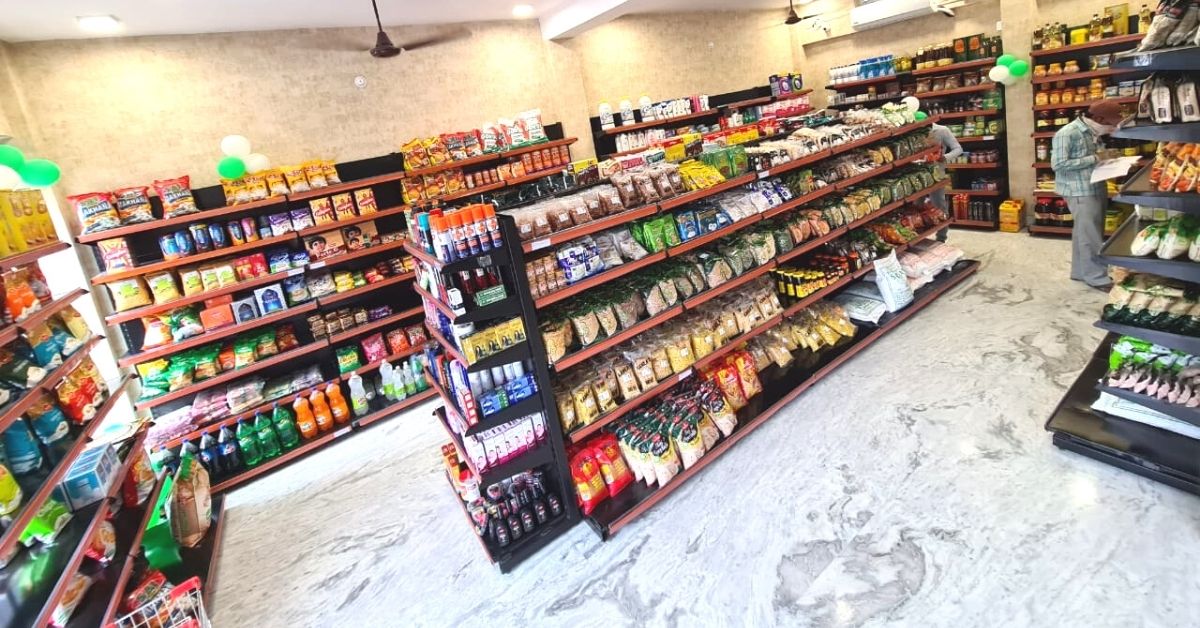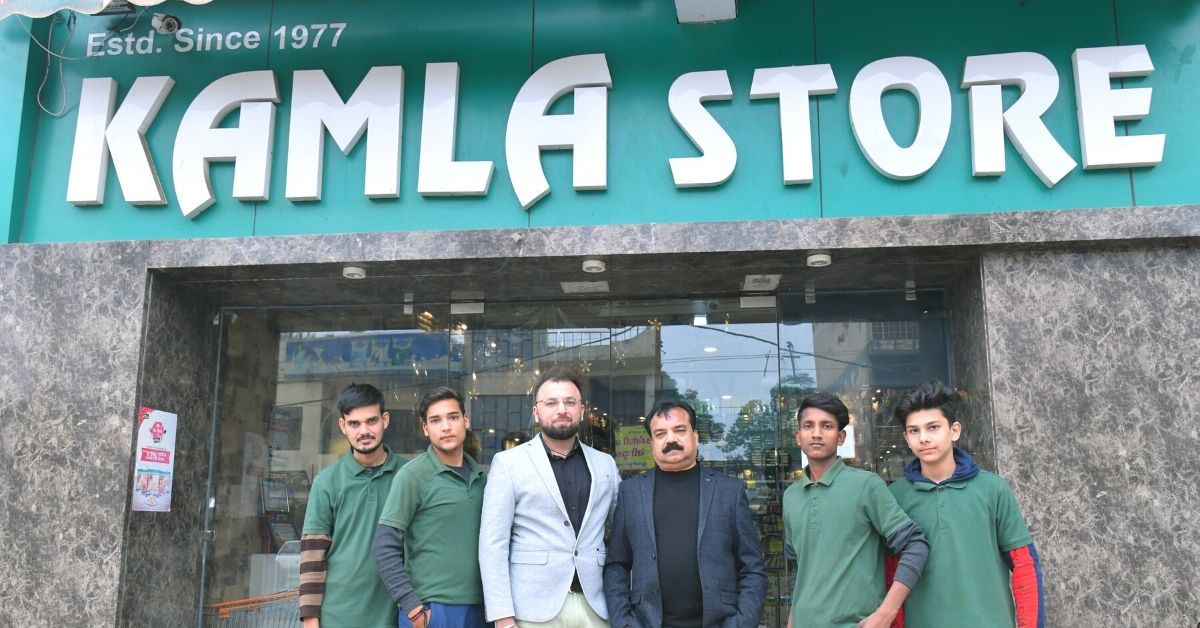In 2006, Sanjay Agrawal upgraded his grocery store from a 10×20 square ft space to a 1,500 sq ft area. However, despite the upgrades and efforts to scale up the business, the store continued to make unimpressive profits.
Sanjay’s son Vaibhav saw his father struggling to earn higher profits and grow his business. But the losses and issues, such as lack of capital or potential risks in additional investments, prevented its growth.
However, the urge to find a way to grow the grocery business made 31-year-old Vaibhav not only help his father’s grocery store but also over 100 shops across a dozen cities in India who now benefit from his startup — The Kiryana Store Company. The startup has generated a revenue of Rs 5 crore in two years.
“My father was the sole breadwinner and owned a shop named Kamla Store in the small town of Saharanpur in Uttar Pradesh. As it was a traditional store, I witnessed the hardships and difficulties faced by such shops first-hand,” he says. Despite knowing the problems, Vaibhav seemed to have no solution to help change the fate of the business that faced the threat of retail giants in India.
After completing his engineering degree in 2013, he spent a few months working at the shop and later joined a multinational company in Mysuru through campus placement. “The retail market there was entirely different. I saw smart stores, different product mixes and chain systems for the retail shops,” he says, adding that he found the retail market dynamics different from what he experienced back in his hometown.
Getting hands-on experience

“The frequent visits to the stores helped me get ideas flowing about what could be done to my father’s store back home. After a year of observation and a few ideas, I quit my well-paying job to return home. In 2014, I joined as a sales manager with a company in Saharanpur for Rs 10,000 a month,” Vaibhav says.
He says that he decided to understand the logistics of the retail market and how product mix changed with geographical distances. “The experience turned out to be an eye-opener as I realised that the product mix changed every 1 km. The presentation and packaging of the product changed too. More business ideas started developing, but I did not feel confident enough to quit my job again as I lacked professional guidance,” Vaibhav says.
Vaibhav adds that in 2014-15, the startup industry saw growth. But he did not know the terms and technicalities of the same. “To learn the concepts, I took admission to study my Master’s in business management in Delhi. The academics and the faculty gave the required guidance and support to channelise the ideas in my mind. I got a deeper understanding of the grocery retail market and its issues as an unorganised sector, its reasons, challenges and possible solutions,” he says.
After completing his Master’s degree in 2017, the entrepreneur joined a Delhi based FMCG company. “The job gave me exposure to the retail market in six states — Punjab, Haryana, UP, Uttaranchal, among others. I learned about sales and distribution networks. I studied every detail of the product flow, presentation and catering to the market segments. I prepared reports which helped me get the theoretical and practical knowledge to some extent,” he says.
A one-stop shop for grocery stores

Vaibhav says he quit within a year to try out his learnings in his family grocery store. “By early 2018, I refurbished the store systematically, which included organising the products, creating software to get the analytics of the product behaviour and inventory management. It was the first time that I implemented the theoretical knowledge and learnings of years to practically benefit the shop,” he adds.
He eliminated losses by removing products that stayed longer on shelves. The store saw its products well organised and arranged in a manner to attend different customer segments. “With many improvements, the customer footfall and consumer spending increased. I also developed software to gauge analytics that helped manage the supply and demand of products. It further ensures quicker movement of the items from the shelves,” Vaibhav says.
The sudden change and improvement became popular through word-of-mouth in our small town. “My first customer visited the store and demanded I help refurbish their store as well. With some efforts put in digital marketing, a few others agreed to do business with me and I launched the startup,” he adds.
Vaibhav says that until January 2021, he has created or revamped 100 grocery stores from 12 cities across India. “Majority of them belong to Tier II and Tier III cities. My experience tells me that people in the grocery business are keen to change, but could not find services that could help them guide, counsel and enable the much-wanted growth. Many of the grocery stores were owned and operated by previous generations belonging to their grandfather or father. They could not adapt to the changing needs of new market demands,” he adds.
Vaibhav says that apart from modernising the traditional stores to smart ones, the company also advises and helps set up a shop from scratch. “We are a one-stop shop solution to set up a grocery store. We also have quality products to offer in hygienic and packaged form. However, the client is free to choose the products as desired. Apart from the setting up fees, the startup charges Rs 1,000 per month for the software and analytics. The analytics report is issued every fortnight to help the owner make the necessary changes in their product range and arrangements. Apart from managing the inventory, the analytics helps boost the business,” he adds.
Competing with giants

The company reported a business of Rs 1 crore in the fiscal year 2019-20. It expects to scale up to Rs 5 crore in March 2020-21. The hardest part of his job is to convince customers. “They want to change, but they need to be advised to help them understand how the profits increase and product dynamics change,” he adds.
Moreover, meeting the client’s budget requirements also helps with demand. “We have worked on setting up stores for as less as Rs 7 lakh and up to Rs 30 lakh. Moreover, it takes about six months to a year to complete the process of guidance, product support, the establishment of stores, product range and other market linkages,” he adds.
Rhea Agrawal from Saharanpur says her business has seen a significant improvement since she revamped her grocery store in 2020. “We started the business in 2019 but it was not streamlined. However, refurbishing the store helped to streamline the flow of the product, manage inventory well and attract more premium customers,” she says.
The 28-year-old says that earlier the customers only bought essential items from the shop. But the “makeover made customers come with an entire grocery list”, thus increasing the product sales and overall business.
Vaibhav has a team of 11 people to reach out to potential clients.
Currently, Vaibhav is working towards establishing a unique distributor system across India that will prove cost-effective and low investments for the clients. “I want to help grocers like my father in Tier II and Tier III cities. The modernising of stores will help them face and compete with the global and domestic giants like Amazon, Flipkart, Reliance and others that are well-established in the retail space,” he adds.
Edited by Yoshita Rao
No comments:
Post a Comment